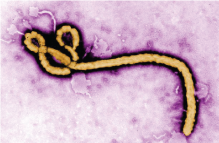 With the first report of Ebola reaching the United States this week, it is important that we do not allow the sensationalism to distract us. As Flight Attendants and Safety Professionals, we come in contact with hundreds of thousands of passengers daily, as we insure they arrive safely to their final destination around the world. Our training and expertise have prepared us for situations like this, and the standard operating procedures outlined in our FAOM under the First Aid chapter, provide us with the tools to protect ourselves while we are onboard the aircraft.
With the first report of Ebola reaching the United States this week, it is important that we do not allow the sensationalism to distract us. As Flight Attendants and Safety Professionals, we come in contact with hundreds of thousands of passengers daily, as we insure they arrive safely to their final destination around the world. Our training and expertise have prepared us for situations like this, and the standard operating procedures outlined in our FAOM under the First Aid chapter, provide us with the tools to protect ourselves while we are onboard the aircraft.
Currently the following are some of the universal precautions already onboard:
- Protective Gloves
- Antimicrobial wipes
- Antiseptic wipes
- Infection Control Kit
- Microshields
- Antimicrobial Soap
It’s important we are informed and aware of the facts about Ebola. The Centers for Disease Control and Prevention (CDC) has provided many resources and guidelines for the airline community. The CDC has reported that when an infection of Ebola occurs in a human, the virus can be spread in several ways to others. The only way Ebola is spread is through direct contact (through broken skin or mucous membranes in, for example, the eyes, nose or mouth) with:
- Blood or body fluids (including but not limited to urine, saliva, sweat, feces, vomit, breast milk, and semen) of a person who is sick with Ebola
- Objects (like needles and syringes) that have been contaminated with the virus
- Infected animals
Ebola is not spread through the air, by water or by food.
It is also important to note the CDC has stated and confirmed that the passenger who traveled on our aircraft was not contagious at the time. It is important to note that for a person to be contagious they must be exhibiting symptoms of Ebola which include a fever (temperature of 101.5) and any one or more of the other following symptoms: headache, muscle pain, diarrhea, vomiting, stomach pain or unexplained bruising or bleeding.
While working a flight, the CDC recommends Flight Attendants to follow standard hygiene practices; frequent hand washing including the wrists, avoid touching your eyes nose and mouth and if you have cuts or sores on your skin, they should be covered with a bandage to control the spread of infection (even when gloves are used during an emergency.)
If you observe a passenger during boarding that appears too ill to fly, your immediate actions should be; to advise the cockpit, Purser and CSR. Besides the general appearance of an ill passenger, other warning signs may include profuse sweating, difficulty breathing, visible rash and persistent coughing. When handling materials contaminated with blood or bodily fluid, you should use Universal Precautions. Treat all blood and bodily fluid as if it is known to be contagious. This can be accomplished by following United's procedures outlined in your FAOM, including the use of the Infection Control Kit and the CPR mask. If you believe you have been exposed to a virus or infectious disease, you should follow instructions provided by MedAire at 877-307-7249 (Domestic) or 480-333-3995 (International) and upon landing, notify a supervisor.
Our AFA MEC Safety, Health and Security Committee along with United Inflight and Medical, the CDC and other World Health Organizations, will continue to monitor all health situations in our workplace and we will report news as necessary.
For more information please visit our MEC Safety, Health and Security page and our Flight Attendant Alert Center for updated important alerts about Ebola and other communications for Flight Attendants. Also visit the CDC's Infection Control Guidelines for Cabin Crew Members on Commercial Aircraft for more information on practical measures you can take to protect yourself, passengers and your flying partners.